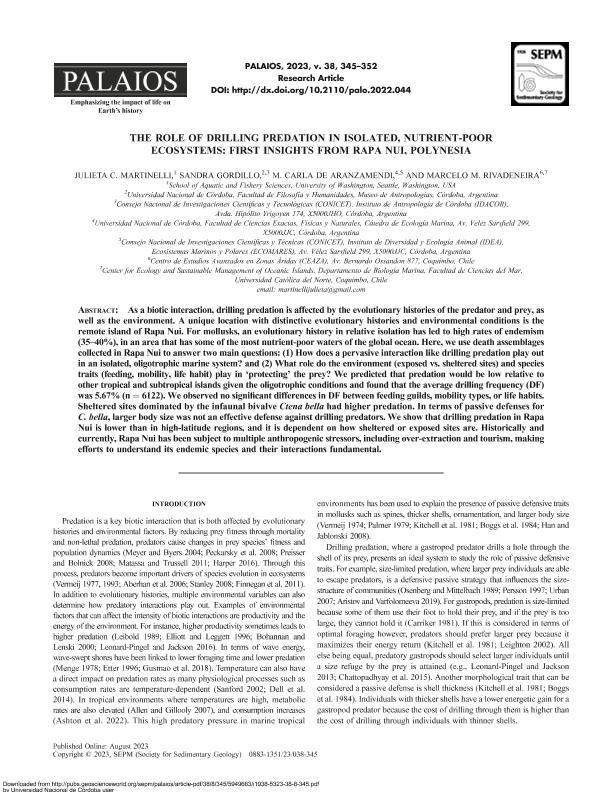Artículo
The role of drilling predation in isolated, nutrient-poor ecosystems: first insights from Rapa Nui, Polynesia
Fecha de publicación:
06/2023
Editorial:
Society for Sedimentary Geology
Revista:
Palaios
ISSN:
0883-1351
Idioma:
Inglés
Tipo de recurso:
Artículo publicado
Clasificación temática:
Resumen
As a biotic interaction, drilling predation is affected by the evolutionary histories of the predator and prey, as well as the environment. A unique location with distinctive evolutionary histories and environmental conditions is the remote island of Rapa Nui. For mollusks, an evolutionary history in relative isolation has led to high rates of endemism (35-40%), in an area that has some of the most nutrient-poor waters of the global ocean. Here, we use death assemblages collected in Rapa Nui to answer two main questions: (1) How does a pervasive interaction like drilling predation play out in an isolated, oligotrophic marine system? and (2) What role do the environment (exposed vs. sheltered sites) and species traits (feeding, mobility, life habit) play in 'protecting' the prey? We predicted that predation would be low relative to other tropical and subtropical islands given the oligotrophic conditions and found that the average drilling frequency (DF) was 5.67%(n 6122).We observed no significant differences in DF between feeding guilds, mobility types, or life habits. Sheltered sites dominated by the infaunal bivalve Ctena bella had higher predation. In terms of passive defenses for C. bella, larger body size was not an effective defense against drilling predators.We show that drilling predation in Rapa Nui is lower than in high-latitude regions, and it is dependent on how sheltered or exposed sites are. Historically and currently, Rapa Nui has been subject to multiple anthropogenic stressors, including over-extraction and tourism, making efforts to understand its endemic species and their interactions fundamental.
Palabras clave:
POLYNESIA
,
OLIGOTROPHY
,
MURICID
,
NATACID
,
ENDEMISM
Archivos asociados
Licencia
Identificadores
Colecciones
Articulos(IDACOR)
Articulos de INSTITUTO DE ANTROPOLOGIA DE CORDOBA
Articulos de INSTITUTO DE ANTROPOLOGIA DE CORDOBA
Articulos(IDEA)
Articulos de INSTITUTO DE DIVERSIDAD Y ECOLOGIA ANIMAL
Articulos de INSTITUTO DE DIVERSIDAD Y ECOLOGIA ANIMAL
Citación
Martinelli, Julieta C.; Gordillo, Sandra; de Aranzamendi, Maria Carla; Rivadeneira, Marcelo M.; The role of drilling predation in isolated, nutrient-poor ecosystems: first insights from Rapa Nui, Polynesia; Society for Sedimentary Geology; Palaios; 38; 5; 6-2023; 345-352
Compartir
Altmétricas




